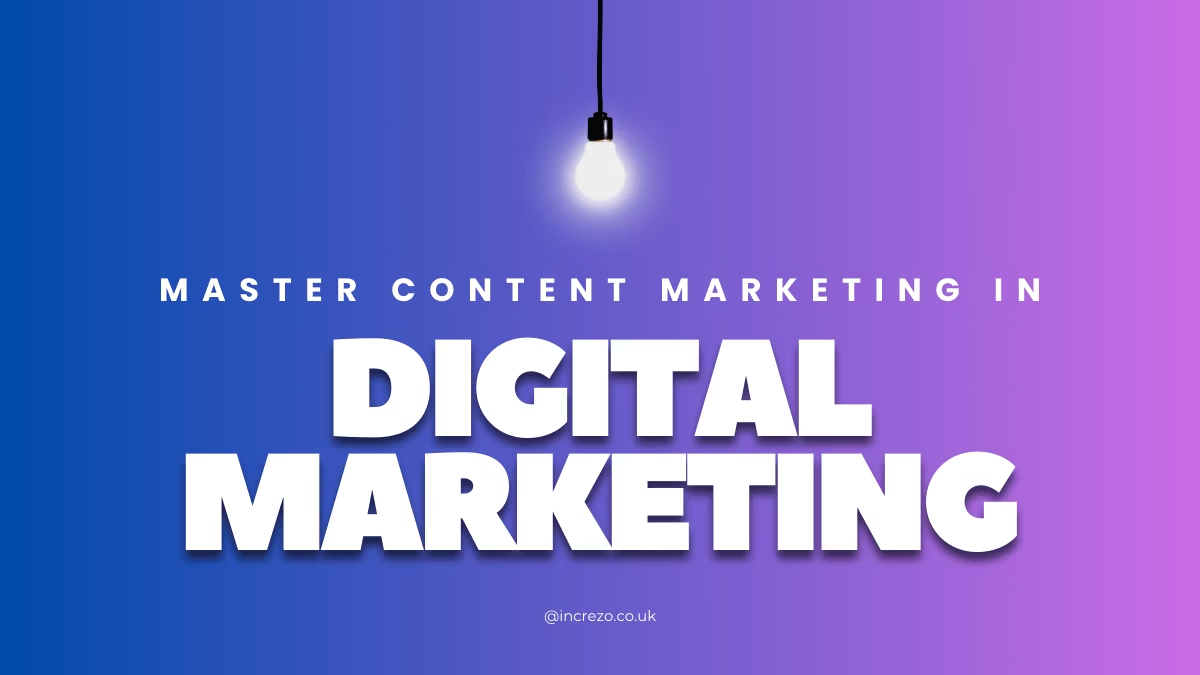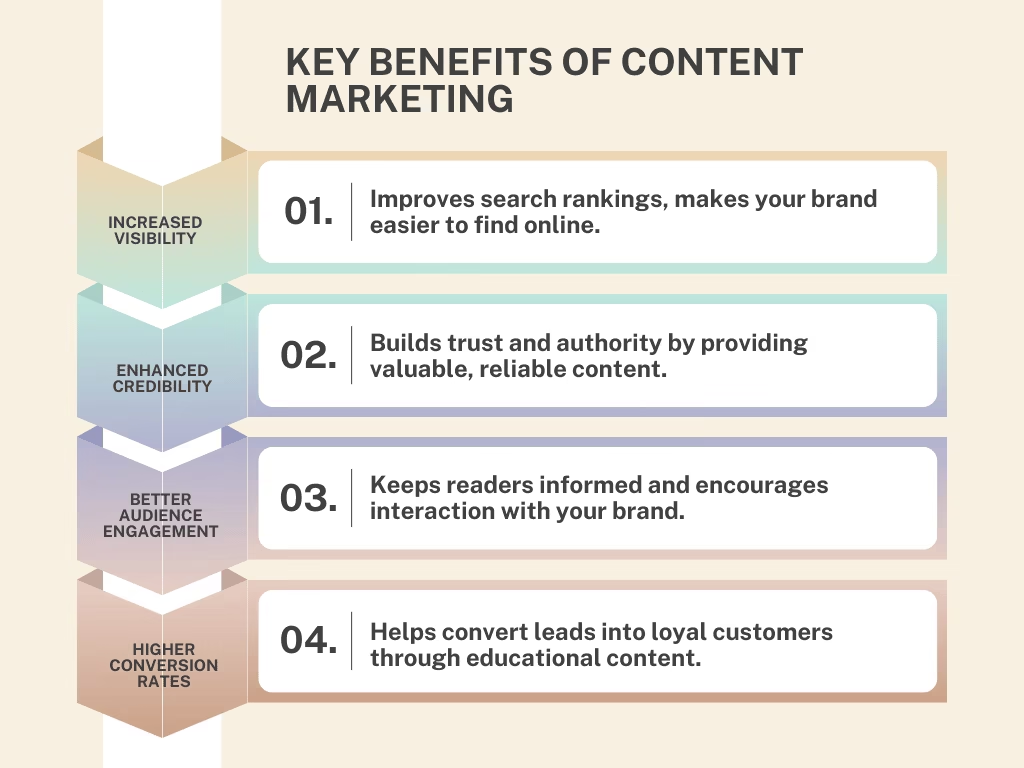Master Content Marketing in Digital Marketing for Growth

Table of Contents
Many businesses are finding it more challenging than ever to stand out online, even with solid digital marketing strategies in place. The sheer volume of content produced every day makes it increasingly difficult to attract and keep the attention of a target audience.
A 2024 survey revealed that approximately 33% of marketing and media leaders highlighted that producing high-quality content is one of their top challenges. Without a focused approach to content marketing, even the best digital marketing efforts can struggle to deliver meaningful growth.
But what if the solution isn’t just about producing more content? What if it’s about creating the right kind of content that grabs attention, builds trust, boosts visibility, and drives sustainable growth?
Content marketing in digital marketing isn’t just a buzzword. It’s a proven strategy for cutting through the noise and achieving measurable results. When done correctly, content marketing can revolutionise your online presence, converting infrequent visitors into devoted clients and making your company stand out in a crowded market.
What is Content Marketing in Digital Marketing?
The term “content for digital marketing” describes the deliberate production and dissemination of worthwhile, timely, and consistent content with the goal of drawing in and holding on to a precisely defined audience. The ultimate goal is to drive profitable customer action by delivering content that informs, engages, and builds trust.
Key Points About Content Marketing in Digital Marketing
- Focuses on providing value to the audience, not just promoting products or services.
- Utilises a variety of formats, including blog posts, videos, infographics, podcasts, and case studies.
- Integrates seamlessly with other digital marketing tactics, such as social media marketing, email campaigns, and SEO.
- Emphasises consistency, ensuring the audience always has fresh, relevant, and helpful content to consume.
Businesses can build deep relationships with their audience by integrating content marketing into their digital strategy, which will eventually boost engagement, trust, and long-term growth.
Why Content Marketing Matters for Business Growth
Content marketing is pivotal in modern business growth strategies by helping companies build trust, enhance visibility, and drive measurable results. Statista estimates that the global content marketing industry generated approximately $63 billion in revenue in 2022, with projections suggesting an increase to $72 billion by 2026.
A well-executed content marketing approach goes beyond basic promotion, delivering value to audiences and encouraging long-term loyalty. Here’s why it matters:
How Content Marketing Boosts Business Growth
- Increases Brand Visibility: Optimised, shareable content can help you increase your reach, draw in more potential clients, and raise your search engine results. According to CMI’s research, 22% of B2B marketers describe their content marketing efforts as extremely or very successful, while 54% report moderate success.
- Establishes Authority and Credibility: High-quality content establishes your business as an industry thought leader, fostering trust and recurring engagement.
- Drives Targeted Traffic: Focused content marketing efforts bring in visitors who are actively seeking your solutions,leading to improved conversion rates and leads of higher quality.
- Improves Customer Retention: Consistent, valuable content fosters long-term relationships with your audience, making them more likely to return, purchase again, and recommend your business to others.
- Supports Other Digital Strategies: Content marketing complements SEO, social media, and email efforts, increasing their effectiveness and resulting in a more comprehensive marketing environment.
By investing in content marketing, businesses not only grow their online presence but also build a foundation for sustained success and competitive advantage.
Key Components of a Strong Content Marketing Strategy
An efficient content marketing plan necessitates a systematic strategy. CMI reports that 73% of major organisations employ individuals to oversee their content marketing strategies, highlighting the importance placed on dedicated management.
Businesses can ensure their content efforts yield meaningful results by following a clear framework. Here are the essential components to include:
1. Key Performance Indicators (KPIs)
- Identify what success looks like—whether it’s increased website traffic, higher conversion rates, or more newsletter signups.
- Define KPIs to measure progress, such as organic traffic growth, average time on page, or lead-to-customer conversion rates.
2. In-Depth Audience Research
- Understand who your target audience is, what they value, and where they consume content.
- Create detailed buyer personas to tailor content topics, formats, and messaging to their preferences.
3. SEO-Driven Content Planning
- Perform thorough keyword research to uncover terms and phrases your audience is searching for.
- Optimise each piece of content for those keywords to improve rankings and visibility in search engines.
4. Content Calendar and Consistent Publishing
- Establish a content calendar to plan ahead and maintain a regular posting schedule.
- Consistency ensures that your audience always has fresh, valuable content to engage.
5. Diverse Content Formats and Channels
- Use a mix of blog posts, videos, infographics, webinars, and social media posts to appeal to different learning styles.
- Leverage multiple platforms—like your website, email newsletters, and social networks—to reach a wider audience.
6. Quality Over Quantity
- Prioritise creating fewer, higher-quality pieces rather than churning out numerous mediocre ones.
- High-quality content not only ranks better but also resonates more deeply with readers. However, according to some reports, content containing 1,000-2,000 words receives 56.1% more social shares than shorter content.
7. Data-Driven Adjustments
- Continuously monitor performance metrics to understand what works and what doesn’t.
- Refine your strategy based on these insights, iterating on topics, formats, and distribution channels to improve results.

Steps to Implement Content Marketing in Digital Marketing
To successfully integrate content marketing into your digital strategy, it’s important to follow a structured, step-by-step approach. These steps guide you from planning to execution, ensuring your efforts deliver measurable results.
1. Define Your Goals and Target Audience
- Identify the objectives you want to achieve, such as increased website traffic, lead generation, or brand awareness.
- Research your audience’s pain points, interests, and preferred content formats to tailor your approach effectively.
2. Perform Thorough Keyword Research
- Use SEO tools to discover the keywords and phrases your audience searches for most.
- Focus on long-tail keywords that align with your audience’s intent and have manageable competition.
3. Plan a Content Calendar
- Map out topics, publication dates, and formats in advance to ensure consistency.
- Incorporate a mix of evergreen and timely content to maintain ongoing relevance.
4. Create High-Quality, Valuable Content
- Craft content that educates, entertains, or solves a problem for your audience.
- Aim for a balance of text-based articles, visual assets (like infographics), and multimedia (such as videos or podcasts).
5. Optimize Content for Search Engines
- Integrate primary and secondary keywords naturally into your content without overstuffing.
- Pay attention to on-page elements like meta descriptions, headers, and image alt text.
6. Distribute Content Across Multiple Channels
- Share your content through various platforms, including your website, social media, email newsletters, and industry forums.
- Leverage partnerships or collaborations to extend your reach further.
7. Measure Performance and Adjust Your Strategy
- Track key metrics like traffic, engagement, conversions, and bounce rates to evaluate content effectiveness.
- Use this data to refine your topics, formats, and distribution methods, continually improving your content marketing efforts.
Following these steps ensures that your content marketing efforts align with your digital marketing strategy, helping you achieve consistent growth and sustained success.
Compelling Digital Marketing Content Examples
Planning a content marketing strategy helps to learn from successful examples. High-performing content often blends creativity, data-driven insights, and a clear understanding of audience needs. Below are some types of digital marketing content that consistently deliver results:
1. Informative Blog Posts and Guides
- In-depth articles that answer specific questions, solve problems, or explain complex topics.
- Evergreen content that remains relevant over time, driving ongoing organic traffic.
2. Engaging Social Media Campaigns
- Interactive posts such as polls, quizzes, or live Q&A sessions to foster direct audience engagement.
- Stories, reels, and carousel posts showcasing behind-the-scenes content or product highlights.
3. Case Studies and Customer Success Stories
- Real-world examples demonstrating how your product or service helped clients achieve their goals.
- Clear data points and testimonials that build trust and showcase your expertise.
4. Videos and Tutorials
- How-to videos, product demonstrations, or expert interviews to educate and engage viewers.
- Short, shareable video clips designed for platforms like YouTube, Instagram, or LinkedIn.
5. Data-Driven Infographics and Reports
- Visual representations of statistics, industry trends, or survey results that are easy to digest.
- Downloadable whitepapers or e-books offering valuable insights in exchange for email sign-ups.
6. Email Newsletters with Curated Content
- Regularly schedule emails featuring a mix of company news, helpful tips, and popular blog posts.
- Personalised recommendations or offers to keep subscribers engaged and coming back.
By studying these examples, you can identify strategies and formats that resonate most with your target audience, helping to craft a content marketing approach that effectively supports your digital marketing efforts.
Conclusion
Mastering content marketing in digital marketing can revolutionise your online presence and drive meaningful growth. With a clear strategy, targeted content, and consistent execution, you can attract, engage, and convert your audience more effectively than ever before.
By following the steps and best practices outlined in this guide, you’ll not only enhance your visibility but also establish a credible, authoritative voice in your industry. Take the time to define your goals, understand your audience, and deliver high-quality content tailored to their needs.
Navigating the complexities of content marketing can be a daunting task, especially when you’re aiming for tangible growth. With 33% of marketing leaders citing high-quality content creation as a primary challenge, it’s clear that a strategic approach is essential.
Our team at Increzo, specialises in transforming your content from a mere presence into a powerful engine for lead generation and brand authority.
We don’t just create content; we craft experiences that resonate with your audience, drive traffic, and boost your rankings. Let us take the burden of content strategy off your shoulders, and together, we’ll elevate your online presence, ensuring you stand out in today’s competitive digital landscape.
Reach out today to discover how we can supercharge your content game and deliver measurable results.
Tagged: Content Creation, Content Marketing, Content Marketing in Digital Marketing, Digital Marketing
Get In Touch Now!
Frequently Asked Questions
Content creation in marketing involves producing valuable materials—such as blog posts, videos, and infographics—that engage and inform your target audience. It’s the foundation of any content marketing strategy, providing the assets needed to attract traffic, generate leads, and ultimately drive business growth.
Yes, content marketing is highly effective. You build trust, improve search engine rankings, and attract qualified leads by offering valuable, relevant content. Over time, it enhances brand credibility, increases customer loyalty, and drives sustainable growth while maintaining cost-efficiency compared to traditional advertising methods.
Start by researching the field and learning the basics of writing, SEO, and audience engagement. Build a portfolio with blog posts, social media content, or videos. Take online courses, follow industry experts, and practice consistently. Over time, you’ll develop the skills needed for a career in content marketing.
A strong strategy begins with clear goals, detailed audience research, and a content calendar. Focus on creating valuable, SEO-optimized materials that address audience needs. Regularly measure performance, refine your approach based on data insights, and maintain consistent messaging to ensure long-term success and sustained engagement.
Understand your audience, stay current with industry trends, and maintain a consistent posting schedule. Prioritise quality over quantity, optimise content for SEO, and measure results to improve over time. Building trust, offering value, and staying adaptable are key to becoming proficient at content marketing.
Content marketing attracts targeted traffic, increases brand visibility, and fosters trust with your audience. By addressing their needs and providing valuable insights, you drive conversions, enhance customer loyalty, and establish authority in your industry, ultimately contributing to sustainable growth and long-term success.
